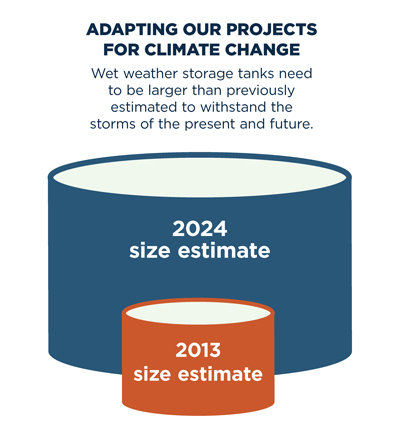Combined sewer overflow investments
King County continues to improve water quality under negotiated changes in the consent decree with regulators to control sewer overflows during heavy storms as climate conditions worsen.
What is a combined sewer overflow?
When heavy rainstorms overload sewer pipes with stormwater, combined sewer overflows (CSOs) release a mixture of stormwater and sewage from specific relief points, called outfalls, into nearby bodies of water to prevent backups into homes and businesses. The combined system is part of the original design of the sewer system in much of Seattle more than a century ago, and King County is improving it. Learn more: King County is Protecting Our Waters
Improving water quality as climate conditions worsen
King County negotiates changes to its combined sewer overflow consent decree
King County Wastewater Treatment Division and federal and state regulators have negotiated several important changes to the mandatory compliance plan that controls wastewater pollution into local water bodies.
Climate change is impacting the way wastewater infrastructure projects are designed and built, handling flow from larger and more frequent storms. We are already seeing more frequent and heavier rainstorms in our region, and this will continue. By the 2080s, our heaviest rain events are expected to be 22 percent heavier.

As a result, we need to build larger, more resilient projects to control and clean the extra water in our combined sewer overflow system and ensure compliance with the regulations. The changes, negotiated with the Environmental Protection Agency, the Washington Department of Ecology, and the U.S. Department of Justice, allow us to upgrade our designs so we can meet our clean water commitments to control combined sewer overflows for decades to come.
The changes update the previous 2013 consent decree to allow the remaining combined sewer overflow control projects to be completed by 2037. This adds seven more years from the original deadline to build larger, more complex and climate-resilient projects that will continue to protect water quality in the Puget Sound region over the long term as storms grow more severe.
The increased timeline also allows for closer coordination between King County and Seattle on remaining, overlapping work under a shared deadline. By working together, joint projects can be more resilient, cost-effective, and have fewer construction impacts on the community.
The timeline in this modification reflects our commitment to the nearly 2 million people we serve and benefits our region specifically in these areas:
- Climate: We are building better projects that protect us against the larger, more frequent storms that are now forecasted.
- Equity: We are sequencing the remaining projects to prioritize those in the Duwamish, where communities are disproportionately affected by environmental pollution.
- Affordability: We are better able to manage the cost burdens on sewer ratepayers by scheduling the remaining CSO projects within our other capital work to modernize the wastewater system.
What happens next?
- King County Council reviews the modification and takes action to approve.
- Next, the U.S. Department of Justice transmits the modification to the federal court for approval. This process also involves publication in the federal register and an additional public comment period.
- The modification is complete when the court gives final approval.
- King County will use the revised schedule for its remaining combined sewer overflow projects.
 View larger version of schedule.
View larger version of schedule.
 Translate
Translate
 View larger version
View larger version